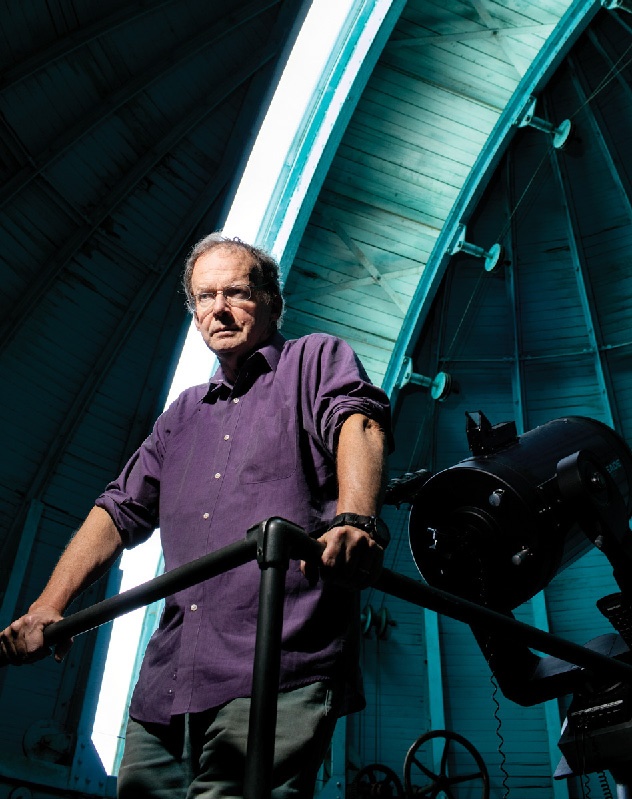Columbia College | Columbia University in the City of New York
The Essentials: Joe Patterson

JÖRG MEYER
Professor of Astronomy Joe Patterson earned a B.A. in the history of science from Harvard in 1969 and was a 22-year-old high school teacher when he discovered a passion for astronomy and launched a summer astronomy camp. He returned to school for formal training, earning a Ph.D. from Texas in 1979. He did postdoctoral work at Michigan and Harvard and was a research scientist at the Smithsonian Astrophysical Observatory before coming to Columbia in 1983; he also was Princeton’s 250th Anniversary Distinguished Teaching Professor in 2002–03. Patterson, who was honored with Columbia’s Presidential Teaching Award in 1997, took time out one evening this past summer to talk about his background and career.
He grew up mostly overseas. “My father was a diplomat and my family lived in Japan for seven years, and then Australia for a year. I came back to the United States when I was 14 and had to learn how to be an American teenager.”
His early interests were philosophy, history and politics, though he always excelled in math. Then in his first year out of college, he saw a total eclipse of the sun. “It was like Paul on the road to Damascus; I never thought there could be anything as beautiful in the world as that day — March 7, 1970 — and when I got home I wrote a story about my experiences. The next day I bought my first telescope.”
He educated himslef in the basics while a high school math and physics teacher in New York City. “I’d take the telescope to Riverside Park on clear nights with the students and kind of learned with them how to use it, although I did try to keep one step ahead of them, so I could teach them something.”
While a teacher, he founded and ran an astronomy camp for two summers in Rhode Island before relocating it to the Mojave Desert, where he turned it into a full-time enterprise. “It was the only camp like it at the time. We got a large fraction of the astronomy fanatic teens of the early ’70s, and a lot of them have become well-known astronomers — the most well-known being Neil deGrasse Tyson GSAS’92 — and professors. We even have reunions.”
His area of specialty is stellar explosions. “You have these very close binary stars that go around one another every few hours. The smaller star has intense gravity; it’s either a white dwarf, a neutron star or a black hole. Gravity rips matter off the companion star, which then falls down onto the more massive star, and as a result — either on a short time scale or on a long time scale — there are explosions on the more massive star. Some are so big that it blows the stars apart; that’s a so-called supernova. There are other smaller explosions called novae and dwarf novae.”
What excites him about his field: “You are trying to answer questions that can be answered. In philosophy, you never do that; you’re asking the same questions Plato asked, and are you getting better answers than Plato? I don’t think so. So it’s hard to figure out whether you’ve made much progress. In science, you do find something substantial and lasting. I was thrilled by that realization, which first hit me while writing my undergraduate thesis on Kepler’s theology.”
He gets observation time on one of NASA’s space telescopes once a year and also uses telescopes in Chile and Arizona. But he also relies on data from the Center for Backyard Astrophysics, an organization of amateur astronomers he started in 1992. “They’re able to do things that professional astronomers are not able to do by virtue of their greater numbers. It’s like having my own network of telescopes scattered around the Earth.”
He thinks the most valuable thing a professor can do is to “identify or ignite a student’s passion. Whatever is second is far behind.”
His favorite class to teach undergraduates is an observational astronomy course, which for many years included a Spring Break trip to Arizona. “We’d either camp out and tour observatories, or in some cases secure observing time with professional observatories.”
He is writing a book about the history of astronomy that grew out of a course he teaches, “Theories of the Uni- verse: From Babylon to the Big Bang.”
In his spare time, he enjoys doing mathematical analysis of sports, especially baseball. “I’m a member of the Society for American Baseball Research. I go to the conventions occasionally and sometimes give papers. I played baseball in high school and college. Age has eroded the skills, but at least the mathematics has stayed the same!”
— Alexis Boncy SOA’11
Issue Contents
Published three times a year by Columbia College for alumni, students, faculty, parents and friends.
Columbia Alumni Center
622 W. 113th St., MC 4530, 6th Fl.
New York, NY 10025
212-851-7852
cct@columbia.edu
Columbia Alumni Center
622 W. 113th St., MC 4530, 4th Fl.
New York, NY 10025
212-851-7488
ccalumni@columbia.edu

